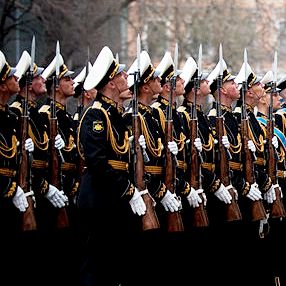At the end of May, I spent a week in Moscow doing some research on various topics. Although it wasn't the central focus of my interviews, I took the opportunity to discuss the state of the Russian military with several scholars and journalists. What follows is a brief summary of my impressions from these conversations.
Shoigu is not reversing Serdyukov's reform. With only one exception, all of my interlocutors agreed that Shoigu is maintaining the main thrust of Serdyukov's reform efforts. He has canceled the decisions that were most upsetting to the senior generals, but kept all the central aspects of the reform. One example: Restoring the Tamanskaia and Kantemirovskaia divisions pleased the traditionalists, but the newly rechristened divisions are unlikely to ever reach actual division staffing levels. Instead, levels are likely to reach 6-7,000 people, higher than the 3,800 assigned to brigades but nowhere near the 13-14,000 personnel assigned to a traditional Russian military division. It's possible that additional divisions will be introduced, but no more than 1-2 per military district, as there are simply not enough personnel in the military to staff all the brigades, let alone restore the old divisions. Similarly, Shoigu's decision to wear a military uniform was designed to make the old guard of the military more comfortable, as part of a campaign to repair relations between the country's civilian leadership and senior generals. He is reported to wear civilian clothing at all times except when he is meeting with the generals. For obvious reasons, Shoigu has been very keen to distance himself from anything related to Serdyukov and the criminal case that was the ostensible reason for Serdyukov's dismissal. But much of this is at the level of perceptions and symbolism, rather than actual policy change.
In fact, many of Shoigu's changes have to be described as largely positive for the Russian military. The introduction of sudden alert drills has demonstrated the lack of preparedness in some units, but is likely to lead to an increase in readiness in the long term. Restoring the position of warrant officer (praporshchik or michman) for technical positions is another needed course correction, though most of the staff in question did not actually leave the military when their positions were eliminated, instead continuing to serve as sergeants. Another important change that has largely gone unnoticed by most commentators has to do with promotions within the military. Serdyukov handled all promotions himself, and approvals came quite slowly. This caused resentment among the officer corps. Shoigu has decentralized and accelerated the process.
Clearly, there are many problems with the military. The rearmament plans incorporated in the current State Armament Program are a fiction and have no chance of being implemented at anywhere near the promised levels. Corruption remains endemic, both at the MOD and in defense industry. And perhaps most seriously, the military seems to have no solution for its manpower crisis. Demographic factors have sharply limited the pool of potential conscripts, while the military remains largely unable to make itself attractive enough to recruit a sizable pool of professional contract soldiers.
But these real concerns should not blind us to the progress that has been made under Serdyukov, nor to the possibility of continued progress under Shoigu. It may well happen that the pessimists turn out to be right and that Shoigu ends up dismantling the positive changes made under Serdyukov. But we should remember that everything Serdyukov did in transforming the military was done at Putin's behest. It's quite likely that priorities have changed and that shaking up the military has now taken a back seat to ensuring stability in a period where the regime is no longer nearly as popular as it once was. That can quite nicely explain the sacrifice of Serdyukov. But on the same count, the military can be satisfied by the combination of going after Serdyukov and the symbolic acts taken so far. Stability and a docile military does not require the dismantling of the entirety of Serdyukov's reform, especially since some aspects of it are now firmly entrenched. Their reversal would lead to greater instability within the military than leaving things alone.
Dmitry Gorenburg is a Senior Analyst at CNA blogging for PONARS Eurasia on military and security affairs in Russia and Eurasia. This comment is also available on Russian Military Reform.









